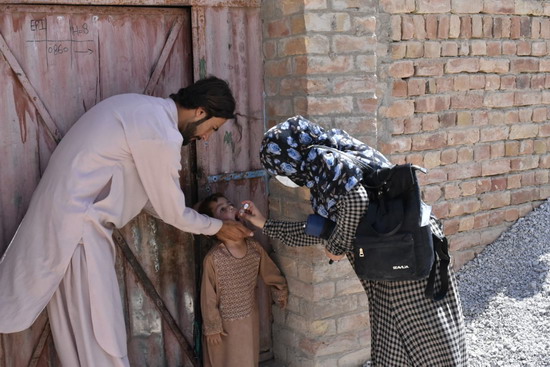Although necessary to protect both health workers and communities from COVID-19, the temporary pause in house-to-house campaigns, coupled with pandemic-related disruptions to routine immunization and other essential health services, has resulted in expanding transmission of polioviruses in the Region.
“Our early stage analysis suggests that almost 80 million vaccination opportunities have been missed by children in our Region due to COVID-19, based on polio vaccination activities that had to be suspended,” said Dr Hamid Jafari, Director for Polio Eradication in the Eastern Mediterranean Region. “That’s close to 60 million children who would have received important protection by vaccines against paralytic polio.”
Both Pakistan and Afghanistan, the world’s last remaining countries endemic for wild poliovirus, are also experiencing widespread transmission of circulating vaccine-derived poliovirus (cVDPV2). Initial vaccination activities in both countries will focus on stopping outbreaks of cVDPV2.
Both vaccine-derived poliovirus and wild poliovirus have the same devastating effect on children: lifelong paralysis and loss of mobility. They also thrive in the same conditions – environments where not enough children have been vaccinated against polio. The key to ending outbreaks of all strains of polio is to raise immunity levels so the virus has no child left to infect.
Polio campaigns resuming in both countries will also support the delivery of broader health interventions, including raising awareness of COVID-19 preventive measures and referring mothers and children for other essential vaccinations and antenatal care services.
“Our teams have been working across the Region to support the COVID-19 response since the beginning of the pandemic, as well as continuing with their work to eradicate polio,” said Dr Hamid Jafari. “Polio workers have for a long time stepped up to the challenge of providing a vital service to their community. They are well known and trusted by the families they have served during the pandemic. When the pandemic spread, we knew what was at stake, and immediately offered our assistance.”
A number of countries in the Region are in early stages of planning to resume vaccination campaigns when the local epidemiological situation permits. “We must now ensure that we work with communities to protect vulnerable children with vaccines, whilst ensuring strict safety and hygiene measures to prevent any further spread of COVID-19”.









